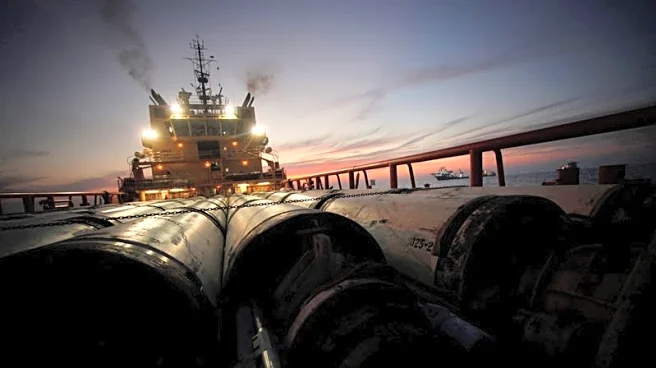What's Happening?
The Philippines and Australia are preparing to sign a new defense agreement next year, as announced by their defense ministers. This pact aims to enhance military cooperation between the two nations in response to shared security challenges in the Indo-Pacific region. Philippine Defense Secretary Gilberto Teodoro highlighted that the agreement will facilitate more frequent joint military exercises, enhancing operational capabilities and regional deterrence. Australian Defence Minister Richard Marles, currently in Manila, noted that the pact would also support the development of defense infrastructure in the Philippines, with projects planned at five locations. The move comes amid increased Chinese vessel presence around the disputed Second Thomas Shoal, coinciding with joint drills between the Philippines, Australia, and Canada.
Why It's Important?
The defense pact between the Philippines and Australia is significant as it represents a strategic response to China's assertive activities in the South China Sea. This region is crucial for global commerce, with over $3 trillion in annual shipborne trade passing through it. The agreement underscores the growing security collaboration among nations in the Indo-Pacific to counterbalance China's influence. For the Philippines, this pact strengthens its military capabilities and regional alliances, potentially deterring unilateral actions by China. Australia, on the other hand, reinforces its commitment to regional stability and security, aligning with its broader strategic interests in the Indo-Pacific.
What's Next?
The signing of the defense pact is expected to occur next year, with both nations likely to continue their joint military exercises in the interim. The Philippines and Australia may also engage in further diplomatic efforts to rally support from other regional allies. The ongoing tensions in the South China Sea could lead to increased military presence and infrastructure development in strategic locations. Additionally, the Philippines might seek to leverage international legal frameworks to address disputes, given the Permanent Court of Arbitration's previous ruling against China's claims.
Beyond the Headlines
The defense pact could have broader implications for regional security dynamics, potentially influencing other nations' military strategies in the Indo-Pacific. It may also affect China's diplomatic relations with neighboring countries, as increased military cooperation among its rivals could lead to heightened tensions. The pact highlights the importance of multilateral approaches to security in contested regions, emphasizing the role of international law and collective defense strategies.










